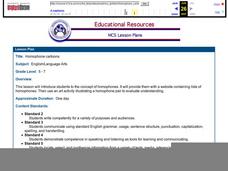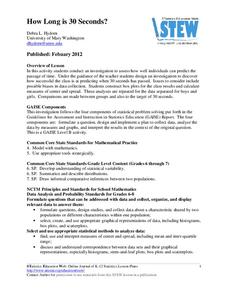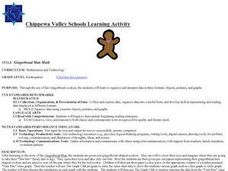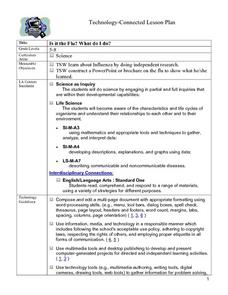Curated OER
Mobile-ize
Second graders, using a minimum of four space figures, create a mobile. They use a "Draw" program to first plan out their figure.
Curated OER
Our Kindergarten Classmates
Students design pictures of themselves and type their names on the pictures using the "Moopies" portion of the Kid Pix Deluxe program. They publish their pictures and create a bulleting board display.
Curated OER
Creating a Children's Book
Students create a studenT book following an introduction to the publication process. Through exposure to several sources, students learn the steps involved in publishing a book.
Curated OER
Following a Monster
Students follow tracks of a monster who has walked through their classroom to see what he has done. They discuss sequencing vocabulary before using computer software students sequence the monster's visit using a concept map. In a word...
Curated OER
Homophone Cartoons
A terrific lesson on homophones awaits your youngsters. First, pupils access a website that contains lists of homophones. Then, it's time to get creative! Everyone gets a piece of poster board and they create a homophone cartoon -...
Curated OER
Identify and Label Different Types of Angles
Young scholars identify and label acute, obtuse, and right angles within a picture. Using Kid Pix software and digital photos, they manipulate, identify, and label the angles and describe the angles to a classmate.
Curated OER
Graphing Memories
Mem Fox’s Wilfrid Gordon McDonald Partridge provides the labels for a graphing activity. Class members create an illustration of a memory item brought from home, and place their illustration in the proper column of a graph. When the...
Curated OER
Let's Learn About Jobs
Students evaluate the jobs that their parents do. In this literature-based social studies lesson, the teacher introduces the concept of work both at home and on the job and leads the children in the creation of a Venn diagram to aid in...
Curated OER
Amate Bark Paintings/Folk Arts of Latin America
Students explore the history of bark paintings in South America and produce their own version of these paintings.
Curated OER
Getting to Know You
After going over the five steps of the writing process, pupils fill out "Getting to Know You" worksheets. They trade papers with each other, and have the task of writing a descriptive paragraph about the person whose worksheet they...
Curated OER
Plant Power
Here is an opportunity for your first graders to take a close look at plants: what they need to survive, how they grow, and the names of each plant part. The book, Corduroy's Garden is used to open the lesson. Then, youngsters utilize...
Curated OER
Categorizing Objects
Kindergartners practice the important skill of placing things in their correct categories. They must discern between items of clothing and items of food. The use of the Inspiration 7 educational software is effectively used in this...
Curated OER
Lowercase and Uppercase #1
Practice with uppercase and lowercase letters using this matching worksheet. There are several letters here and scholars match the ones that make the same sound. The trick is that the matching pairs are between capitals and lowercase...
Curated OER
Match the Words
Even if your kids aren't reading yet, they can become familiar with words by identifying two that are the same. Youngsters focus on the word same as they examine eight words and match them to their identical spellings. Challenge learners...
American Statistical Association
Don't Spill the Beans!
Become a bean counter. Pupils use a fun activity to design and execute an experiment to determine whether they can grab more beans with their dominant hand or non-dominant hand. They use the class data to create scatter plots and then...
American Statistical Association
How Long is 30 Seconds?
Is time on your side? Pupils come up with an experiment to test whether their classmates can guess how long it takes for 30 seconds to elapse. They divide the class data into two groups, create box-and-whisker plots, and analyze the...
American Statistical Association
Step into Statastics
Class members study the size of classmates' feet and perform a statistical analysis of their data. They solve for central tendencies, quartiles, and spread for the entire group as well as subgroups. They then write a conclusion based on...
Statistics Education Web
It Creeps. It Crawls. Watch Out For The Blob!
How do you find the area of an irregular shape? Class members calculate the area of an irregular shape by finding the area of a random sampling of the shape. Individuals then utilize a confidence interval to improve accuracy and use a...
Texas Education Agency (TEA)
Byzantine Architecture
View Byzantine architecture from the comfort of your classroom. A PowerPoint presentation introduces important vocabulary terms and examples of Byzantine architecture in the ninth lesson plan of the 11-part series. A Jeopardy game...
Curated OER
Gingerbread Man Math
Students collect and explore gingerbread man data. In this math and technology lesson plan, students examine how to organize and interpret data in three formats: objects, pictures, and graphs.
Curated OER
Is It The Flu? What Do I Do?
Students use the internet to research the flu. Using various websites, they identify who should get flu shots, how to protect themselves and guidelines for getting over the flu. They write a one page report on their findings to end the...
Curated OER
Healthy Happy heart Booklet
Students complete activity pages in a book to demonstrate their understanding of a healthy heart.
Curated OER
Eight Lines about home
Students brainstorm positive things about their city and write an eight line poem about it.
Curated OER
Fall Similes and Metaphors
Young scholars interpret what a similies and metaphors are. They give examples of similies and metaphors. Pupils write different similies and metaphors using fall or autumn descriptive words. Students base their comparisons on facts,...

























